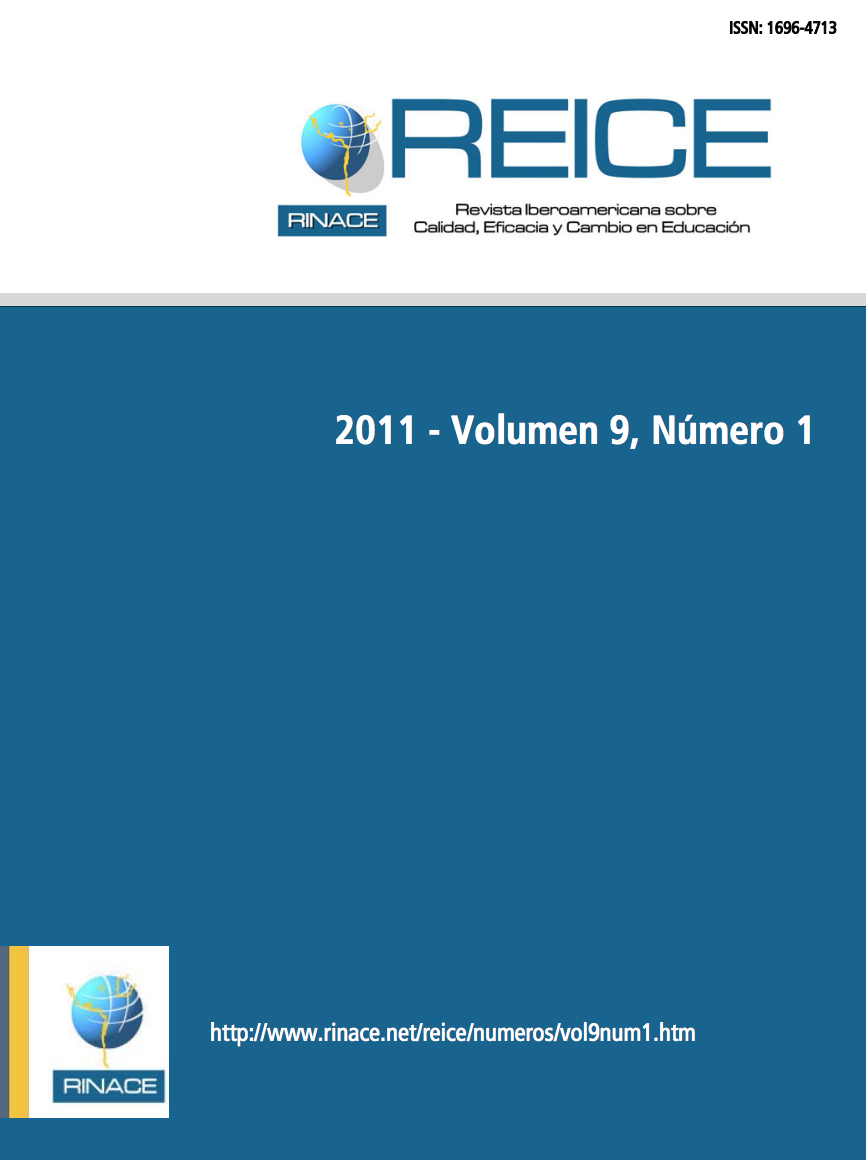Keywords:
Constructivist Theory, adult learning, professional education, development managers, action learning, situated learning, critical reflection, graduate programCopyright (c) 2023 REICE. Revista Iberoamericana sobre Calidad, Eficacia y Cambio en Educación

This work is licensed under a Creative Commons Attribution-NonCommercial-NoDerivatives 4.0 International License.
Abstract
This paper uses the constructivist premises of adult learning, collecting transposed to the organizational field, aiming to reflect on the existence and viability of a constructivist organizational learning. Thus, this study aims to: Understand how the learning process happened managers to identify which premises are constructivists are experienced in the management reality. The theoretical framework demonstrates the narrow relations between the two main streams of managerial learning (action learning and situated learning) with constructivist ideas (mainly from Dewey and Vygotsky). In the empirical part, it was conducted a qualitative study, through in-depth interviews with eight junior managers. It was possible to identify that they had used various forms of learning, but the biggest highlight was learning through action, followed by social relations. This fact corroborating finished with the main theoretical trends on managerial learning. However, it was observed that managers do not have the habit to reflect during their work and do not perceive the importance of reflection, much less use critical reflection. That is, the constructivist premises are partly used in learning management.
Downloads
References
Argyris, C. (2000). Ensinando pessoas inteligentes a aprender. In. Harvard Business Review, Gestão do conhecimento, pp. 82-107. Rio de Janeiro: Campus.
Bacon, D. (2004). An examination of two learning styles measures and their association with business learning. Journal of Education for Business, 79(4), pp. 205.
Brookfield, S. (1986). Understanding and facilitating adult learning. San Francisco: Jossey-Bass.
Brown, J., Collins, A., Duguid, P. (1989). Situated cognition and the culture of learning. Educational Researcher, 18(1), pp. 32-42.
DeFillippi, R.J. (2001). Introduction: project-based learning, reflective practices and learning outcomes. Management Learning, 32(1), pp. 5-10.
Dewey, J. (1971). Experiência e educação. São Paulo: Companhia Editora Nacional.
Easterby-Smith, M. (1997). Disciplines of organizational learning: contributions and critiques. Human Relations, 50(9), pp. 1085-1113.
Fox, S. (1997). From management education and development to the study of management learning. In: Burgoyne, J., Reynolds, M. Management learning: integrating perspectives in theory and practice. pp. 21-37. London: Sage.
Freire, P. (1987). Pedagogia do oprimido. Rio de Janeiro: Paz e Terra.
Gherardi, S., Nicolini, D. (2002). Learning in a constellation of interconnected practices: canon ou dissonance? Journal of Management Studies, 39(4), pp. 419-436.
Gherardi, S., Nicolini, D., Odella, F. (1998). Toward a social understanding of how people learn in organizations. Management Learning, 29(3), pp. 273-297.
Grohmann, M. Z. (2004). Influências de um curso de pós-graduação no processo de aprendizagem gerencial. Tese de Doutorado não publicada. Universidade Federal de Santa Catarina, Florianópolis, Brasil.
Hill, L. (1993). Novos Gerentes: assumindo uma nova identidade. São Paulo: Makron Books.
Kolb, D. (1984). Experiential Learning. Englewood Clitfs, New Jersey: Prentice Hall.
Lave, J.; Wenger, E. (1991). Situated learning: legitimate peripheral participation. Cambridge: Cambridge Press.
Lucena, E. (2001). A natureza da aprendizagem de gerentes-proprietários do setor de varejo de vestuário de Florianópolis. Tese de Doutorado não publicada. Universidade Federal de Santa Catarina, Florianópolis, Brasil.
Merriam, S. B., Caffarella, R. (1991). Learning in adulthood: a comprehensive guide. San Francisco: Jossey-Bass.
Merriam, S. B. (1998). Qualitative research and case study applications in education. San Francisco: Jossey-Bass.
Mezirow, J. (1981). A critical theory of adult learning and education. Adult Education, 32(1), pp. 3-24.
Moraes, L.V.S. (2000). A dinâmica da aprendizagem gerencial. Dissertação de Mestrado não Publicada. Universidade Federal de Santa Catarina, Florianópolis.
Morgan, G., Smircich, L. (1980). The case for qualitative research. Academy of Management Review, 5(4), pp. 491-500.
Morgan, G. (1990). How critical reflection triggers transformative learning. In: Morgan, G. Fostering critical reflection in adulthood: a guide to transformative and emancipatory learning, pp. 1-20. San Francisco: Jossey-Bass.
Nicolini, D., Meznar, M.B. (1995). The social construction of organizational learning: conceptual and practical issues in the field. Human Relations, 48(7), pp. 727-746.
Palmer, J., Richards, I. (1999). Get knitted: network behavior in the new economy. Journal of Knowledge Management, 3(3), pp. 191-202.
Preskill, H., Torres, T. (2001). Papel do inquérito de avaliação na criação de organizações de aprendizagem. In. Easterby-Smith, et al., Aprendizagem Organizacional e Organização de Aprendizagem, São Paulo: Atlas.
Raelin, J. A. (2001). Public reflection as the basis of learning. Management Learning, 32(1), 11-30.
Reed, M., Anthony, P. (1992). Professionalizing management and managing professionalization: British management in the 1980’s. Journal of Management Studies, 29, pp. 591-613.
Smith, P.A. (2001). Action learning and reflective practice in project environment that are related to leadership development. Management Learning, 32(1), pp. 31-48.
Schön, D. (2000). Educando o profissional reflexivo: um novo design para o ensino e a aprendizagem. Porto Alegre: Artmed.
Schön, D. (1983). The reflective practitioner. New York: Basic Books.
Silva, M.A. (2000). A aprendizagem de professores da Universidade Federal de Santa Catarina para dirigir as unidades universitárias. Tese de Doutorado não Publicada. Universidade Federal de Santa Catarina, Florianópolis, Brasil.
Taylor, S., Bogdan, R. (1998). Introduction to qualitative research methods: a guidebook and resource. New York: John Wiley & Sons.
Vygotsky, L. S. (1998). A formação social da mente. São Paulo: Martins Fontes.
Wood Jr, T., Paula, A.P.P. (2001). Pop-management. Anais do XXV Encontro Nacional de Pós-Graduação em Administração, Campinas, Brasil.
Yin, R. (1984). Case study research: design and methods. California: Sage.
